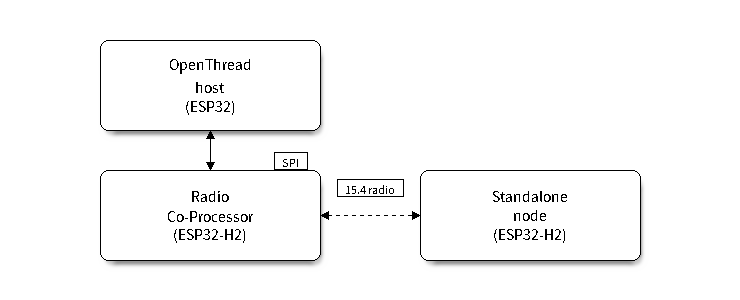警告
This document is not updated for ESP32H2 yet, so some of the content may not be correct.
This warning was automatically inserted due to the source file being in the add_warnings_pages list.
OpenThread
OpenThread is a IP stack running on the 802.15.4 MAC layer which features mesh network and low power consumption.
Mode of the OpenThread stack
OpenThread can run under the following modes on Espressif chips:
Standalone node
The full OpenThread stack and the application layer runs on the same chip. This mode is available on chips with 15.4 radio such as {IDF_TARGET}.
Radio Co-Processor (RCP)
The chip will be connected to another host running the OpenThread IP stack. It will send and received 15.4 packets on behalf of the host. This mode is available on chips with 15.4 radio such as {IDF_TARGET}. The underlying transport between the chip and the host can be SPI or UART. For sake of latency, we recommend to use SPI as the underlying transport.
OpenThread host
For chips without 15.4 radio, it can be connected to an RCP and run OpenThread under host mode. This mode enables OpenThread on Wi-Fi chips such as ESP32, ESP32-S2, ESP32-S3 and ESP32-C3. The following diagram shows how devices work under different modes:

OpenThread device modes
How To Write an OpenThread Application
The OpenThread openthread/ot_cli example will be a good place to start at. It demonstrates basic OpenThread initialization and simple socket-based server and client.
Before OpenThread initialization
s1.1 The main task calls
esp_vfs_eventfd_register()to initialize the eventfd virtual filesystem. The eventfd file system is used for task notification in the OpenThread driver.s1.2 The main task calls
nvs_flash_init()to initialize the NVS where the Thread network data is stored.s1.3 Optional, The main task calls
esp_netif_init()only when it wants to create the network interface for Thread.s1.4: The main task calls
esp_event_loop_create()to create the system Event task and initialize an application event’s callback function.
OpenThread stack initialization
s2.1: Call
esp_openthread_init()to initialize the OpenThread stack.
OpenThread network interface initialization
The whole stage is optional and only required if the application wants to create the network interface for Thread.
- s3.1: Call esp_netif_new() with ESP_NETIF_DEFAULT_OPENTHREAD to create the interface.
- s3.2: Call esp_openthread_netif_glue_init() to create the OpenThread interface handlers.
- s3.3: Call esp_netif_attach() to attach the handlers to the interface.
The OpenThread main loop
s4.3: Call
esp_openthread_launch_mainloop()to launch the OpenThread main loop. Note that this is a busy loop and will not return until the OpenThread stack is terminated.
Calling OpenThread APIs
The OpenThread APIs are not thread-safe. When calling OpenThread APIs from other tasks, make sure to hold the lock with esp_openthread_lock_acquire() and release the lock with esp_openthread_lock_release() afterwards.
Deinitialization
The following steps are required to deintialize the OpenThread stack:
- Call esp_netif_destroy() and esp_openthread_netif_glue_deinit() to deintialize the OpenThread network interface if you have created one.
- Call esp_openthread_deinit() to deintialize the OpenThread stack.
The OpenThread border router
The OpenThread border router connects the Thread network with other IP networks. It will provide IPv6 connectivity, service registration and commission functionality.
To launch an OpenThread border router on a ESP chip, you need to connect an RCP to a Wi-Fi capable chip such as ESP32.
Call esp_openthread_border_router_init() during the initialization will launch all the border routing functionalities.
You may refer to the openthread/ot_br example and the README for further border router details.